Happiness is to have a hand again. Soldier talks about injuries, amputation and electric prosthesis
From birth, a person needs to use 14 muscles to move his or her hand. But after losing a limb, simple movements seem to be something of a miracle. Vitalii is a military man who lost an arm during the battles near Sievierodonetsk in June 2022.
Before the full-scale invasion, he was serving as a contract soldier, having signed on when he turned 18 in 2016. "There are some stories that read like a book. Mine is like a movie," says Vitalii.
His story is similar to a blockbuster, where the narrator is also a direct participant in the hostilities. After the amputation, he, like hundreds of soldiers, waited a long time for a mechanical prosthesis provided by the state. But while he was waiting, he was offered a state-of-the-art electric prosthesis from the Superhumans Center for the treatment and rehabilitation of war victims.
His new hand can make 6 moves.
But the most important thing is that it helps Vitalii return to his normal life, with a certain functionality of the lost limb. Vitalii told Ukrainska Pravda.Zhyttia about his military career, his injuries, rehabilitation and how it feels to have the Superhumans electric prosthesis. This is his story.
"Why is there no war for me?
I want to fight like my grandfathers..."
When Maidan [2014 Ukrainian Revolution of Dignity] began, I was 15 years old. I was in the 10th grade and during every break I used to go to the teacher's room to watch the live broadcast of the events. I was excited and proud of my people.
At that time, one of my older acquaintances enlisted. When he came home in uniform, I tried on his cap and was ecstatic! So I firmly resolved that I would go to serve in the army when I turned 18.
As a child, I watched a lot of films about war - the First World War, the Second World War, and Afghanistan. And I thought: "Why is there no war for me? I want to fight like my grandfathers...".
In 2016 (when I reached the age of adulthood), I went to collect a package of documents from the Military Enlistment Office. I went to the training centre, passed the physical training but failed the tests. The military said I had low moral character.
At the time, I was simply too nervous to listen to the intonation of the psychological questions. I returned home, again contacted the Military Enlistment Office, told them about the tests and reminded them that I really wanted to serve. I was sent to the training centre again.
This time in Desna, Chernihiv Oblast, where the infantry was trained. I passed the same tests without any problem.
First combat experience
The training lasted two months, and then I was sent to Donetsk Oblast. I went to the east on 4 September 2016, and to the frontline, in Terikon, on 6 September.
They gave me the nickname Ara because I am very tanned, with a beard. I have a dark face when I tan. And I talk a lot.
I got my first combat experience in the Avdiivka industrial zone in 2017. There, across the street, 70 metres from us, the separatists were sitting.
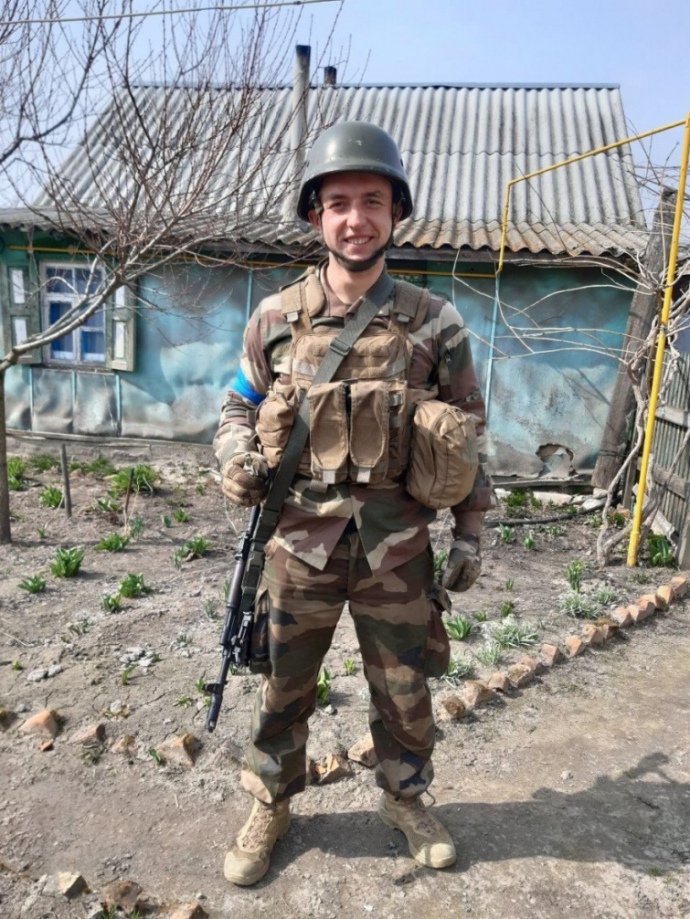 Vitalii in the eastern part of UkraineArchival photo
Vitalii in the eastern part of UkraineArchival photo
I was not very experienced yet - I knew only how to fire a machine gun. But I picked up information on the fly.
It was interesting and easy for me. For example, a bullet was flying straight, so I stood on the side, watching. Then I would see the dust rising, which means the machine gun was working.
So I would shoot there, and then it would be quiet. The frontline is a kind of counter-strike: you run to one place, shoot with an RPG [rocket-propelled grenade - ed.], then run over to find VOGs [high-explosive grenades - ed.] falling, run for cover and shoot back with a machine gun.
A sniper's bullet
In 2018, I received a bullet wound in Luhansk Oblast. A sniper shot at me.
The bullet passed obliquely and went straight through. It was in the middle of the day, I was smoking a cigarette, and suddenly my arm twitched and seized up. I couldn't even throw away the cigarette butt - I lost sensation and muscle function.
My clothes were soaked with blood. I ran into the dugout, applied thermal underwear, and asked the senior officer to see if there was an exit wound. There was, but there was no blood - it looked like a red dot.
They sealed it with reinforced tape and injected me with painkillers. The platoon commander came running and asked: "Who was wounded? Ara, was it you?" I answered: "Yes, it was me." We started running.
We ran and came to an evac. The commander asked: "So, who is wounded?". My arm was just shaking, but I felt fine.
I was taken to Kharkiv and prescribed treatment, but no rehabilitation. A few days later, my fingers started moving, but I had to wear a cast. Two weeks later, I was sent on leave and given a month to recover.
However, I only managed to recover fully after about 1.5 years, that is, after the end of my military contract. And when I returned home, I was depressed - I didn't want to do anything, I didn't feel any positive emotions. I was used to the stress of war, and it seemed to me that this was my natural state.
But in civilian life, this is not the case.
The beginning of the full-scale invasion
From 2019 until the full-scale Russian invasion, I was trying to find myself. I was constantly changing jobs. I was drawn back to the war.
Before the invasion, I went to work in Poland in the winter. I was working on the night of 23-24 February 2022 and had a shortened shift. I did not believe the invasion was happening until the last moment, although I had watched Putin's address.
It seemed like a piece of fake news. Then my friends confirmed my worst fears - the war had started.
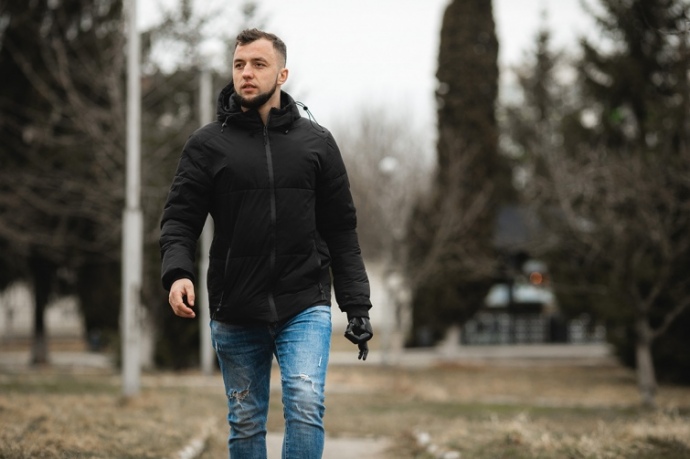 Vitalii is already wearing a prosthesisPhoto by Superhumans
Vitalii is already wearing a prosthesisPhoto by Superhumans
I had a plan in my head: I would go to my employer, pick up my paycheck, pack my things and leave for Ukraine. I arranged for a friend to pick me up from Lutsk.
On the evening of 25 February, I got to the Military Enlistment Office with my friend, but they refused to take us and asked us to come back the following day. I called my close friends - they had saved a place for me on the brigade, and that was a position of accountant. I served in my native city of Zhytomyr and in Kyiv Oblast, and later in the east.
We were positioned near Sievierodonetsk: the unit was covering the flanks of the city, and it was hell. The Russians were constantly firing on our positions with all kinds of weapons.
A day of unequal combat
They started shelling us on the night of 12-13 June. I was the most senior person at the position, with 15 people under me.
We were near the railway line, so the shells either didn't hit us or they went far over us. But we were being f**ked all night. Two hours later, the shelling started again - they were aiming at us, right next to the trenches, 5-10 metres away.
Later I thought that I should have fired on the bushes with the help of those who adjust fire, but there was no time for that. I was constantly learning something new about combat techniques, and I found the training videos of the Russian special forces very useful. It's very convenient to use the enemy's techniques against them.
We were in a vicious cycle of "shelling - assault", which is very exhausting. Around lunchtime, the commander ordered us to withdraw people from the position. But the Russians were shelling so f**king hard that there was a much better chance of survival in the trenches.
When we started to withdraw, the shelling stopped. When an infantry fighting vehicle arrived at another spot to evacuate us, we loaded up the wounded - some of them even had to be forced to sit down. And then I went to the dugout and sat down and cried.
My emotional stress was at its peak, I started shaking... (wipes his eyes - ed.)
Tank impact injury
The company commander decided that we would be staying in a remote position that guarded the road. One guy took up the defen?e on one side, I on the other. We agreed that if the Russian "tanchiki" (tanks) came, he would meet them head-on, and I would meet them from the flank.
Around 20:00 (Kyiv time), I went with the guys to get a combat kit and a battery for the walkie-talkie. I went into the dugout, lit a cigarette, and heard on the radio: "tanks are coming!". I returned to my position and went to the intersection - 150 metres.
I need 5 seconds to shoot from a hand-held anti-tank grenade launcher, but I won't have that time if a tank is already coming at me. There were bushes growing along the road that partially blocked visibility. The enemy's tank was more competent and shot me.
A black dot flew at me, and a moment later, my hand went limp.
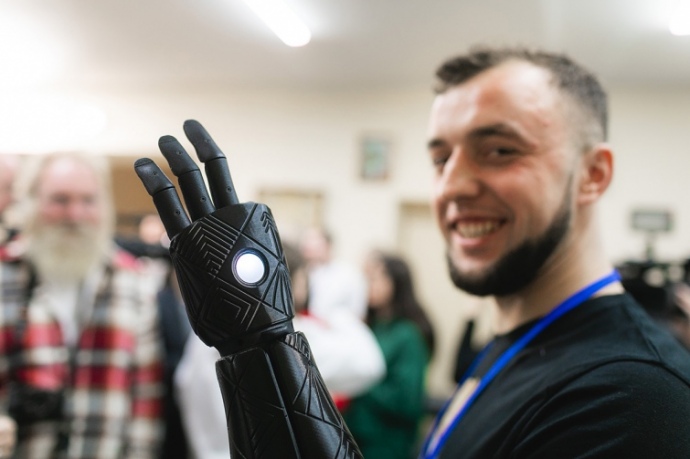 Vitalii with an electric prosthesis
Vitalii with an electric prosthesis
I didn't hear the sound of a gunshot or explosion. When I felt pain in my arm, I asked my fellow soldier to put on a tourniquet because the blood was gushing. The wound looked as if it had been hit with a chop hammer.
The walkie-talkie, let me remind you, was dead. I had left it in position, and the battery was in my pocket. I went to the medics and called for evacuation.
With the doctor, we went out into the yard, and bomblets started falling. The doctor's legs were cut and he was concussed, but I was only hit - a fragment flew into my shin. The evacuation armoured infantry combat vehicle was standing at the intersection, 50 metres away, but there was an intense battle underway.
The vehicle itself was not very quiet, but it just took someone and drove away. I decided to go on my own. After about 20 minutes, I felt weak and threw off my body armour, helmet, and machine gun.
My brothers-in-arms saw me, picked me up because I was already sleepy, and took me to a neighbouring village, and from there to be evacuated.
Life with amputation and phantom pains
My arm was amputated on the same day, 13 June, in a hospital in Bakhmut and I was then taken to Vinnytsia. I was still on adrenaline at that time, cheerful and charged. I joked that "sniper" and "tanchik" (tank driver) were already in my biography, and I wonder what's next?
When I went to war, I realised I could die, lose a leg or an arm, and be captured. I accepted it for myself. But was I ready?
I don't think so. Irritation set in about two weeks after the amputation. In addition, I started having phantoms [phantom pain - ed.].
Painkillers didn't help. For the first 3-4 days, it felt like a piece of hot metal was being applied to me and was clamped in a vice. I couldn't sleep at night because of the pain and anger I felt.
I could go to rehab and leave if the doctor didn't show up within three minutes. My sister came to see me in Vinnytsia, even though I asked her not to. It's just that when relatives arrive, they sit next to each other and cry or look at you with sadness.
And these definitely are not the emotions that support and motivate you to get moving. Before New Year, as predicted - half a year after the injuries - I began to lack sleep and had the desire to kill. I wanted to catch a Russian and just cut his throat.
This thought caused me emotional excitement and satisfaction. Then I started seeing a psychologist and a psychiatrist to help alter my mental state. I got involved in more sports and found some things I enjoyed doing, particularly reading books, playing backgammon, and meditation.
Every day I went to the gym and got to work with a rehabilitation therapist. I have fully restored my biceps. I can do 50 push-ups with my arm by adding some kind of support to compensate for the length.
Sometimes we fool around with the guys, as when I use my stump and my right hand to do some boxing with them. I recovered physically in about three months. Mentally, I was ready to combat, but not for everyday life.
A cyborg-like hand
The state provides all soldiers with a mechanical prosthesis after they have a limb amputated, and automatically creates a waiting list for them.
There are a lot of wounded soldiers, and only a few factories in Ukraine that produce those prostheses. So, I received my mechanical one 7 months after the amputation. I need a prosthesis to get back to the guys.
I found a video where some people were fighting [on the frontline] even with hooks [instead of a hand - ed.]. While the prosthesis was being manufactured, I was contacted by the Superhumans Center through my prosthetist and offered an electric prosthesis. I had to go to Munich, where a conference was taking place.
You could choose designs from Marvel based on the Black Panther, Iron Man, and Star Wars comics.
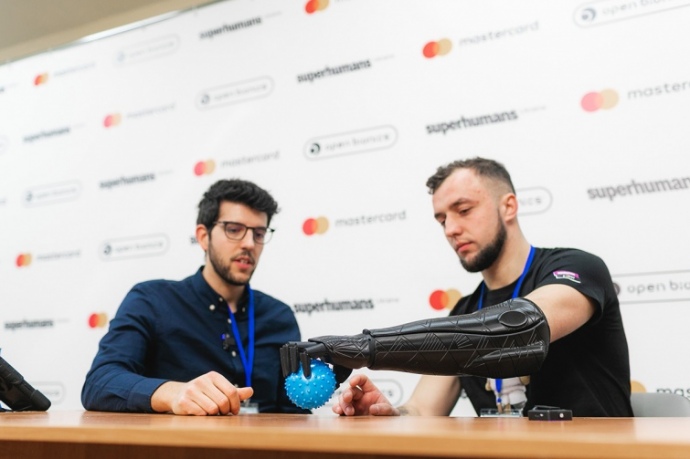 First movements with the electric hand
First movements with the electric hand
I picked plain black because you can't change the colours in the stylised ones. Later, I'll get a tattoo on my shoulder so that I have a cyborg-like hand. My measurements were taken, plaster casts were made, and then there were fittings and the first training sessions.
Electrodes were attached to my muscles, and I had to try to bend my finger or pick up something from the table. It was an incredible feeling! And in 1.5 months the prosthesis was produced for me.
For reference: Right now, it's enough to fill out an application on the Superhumans website to get an electronic prosthesis. Then the person is put on a waiting list, and both military and civilians affected by the war may apply.
First hour with a Superhumans prosthesis
The stump changes in size over the first year. Therefore, the measurements taken abroad at the time of the prosthesis fitting in Ukraine were irrelevant.
The socket [the part of the prosthesis where the stump is inserted] turned out to be rather big. It took me about an hour to figure out what to do with it in the test version. There is nothing tricky here.
The body of the prosthesis was made on a 3D printer. It has sensors inside that react when I flex certain muscles. For example, there is a flexor and extensor of the hand, which is responsible for its position.
Therefore, when I strain the flexor, my prosthetic hand bends towards my arm. The prosthesis has 6 different movements, but you need to practise to be able to master them in everyday life, i.e., making coffee, making a bed, etc. Small and slippery things are not yet possible.
A jacket zipper, a marker or a phone would just slip out.
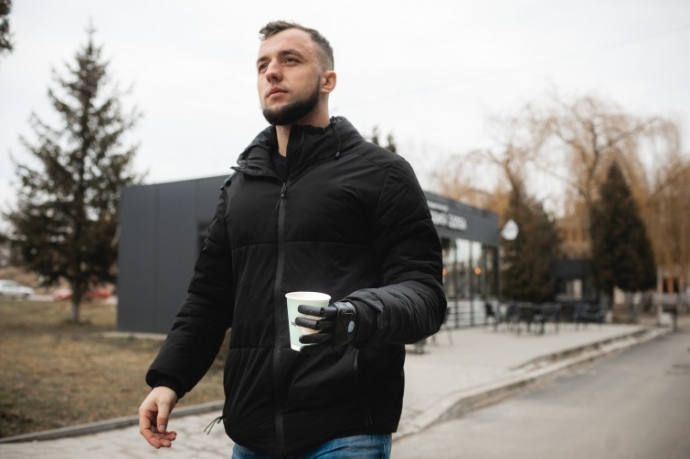 Holding a coffee in his left hand is one of Vitalii's dreams
Holding a coffee in his left hand is one of Vitalii's dreams
Although I like this arm very much, I will go back to the front with a mechanical one. This one, despite its many advantages, such as lightness, mobility, and functionality of movement, also has disadvantages. In particular, it is not waterproof, needs charging and is a bit noisy for the front line.
I am sure this prosthesis will come in handy after Victory! Viktoriia Andrieieva, specially for Ukrainska Pravda.Zhyttia Translation: Elina Beketova, Myroslava Zavadska, Yuliia Kravchenko, and Artem Yakymyshyn
Editing: Monica Sandor